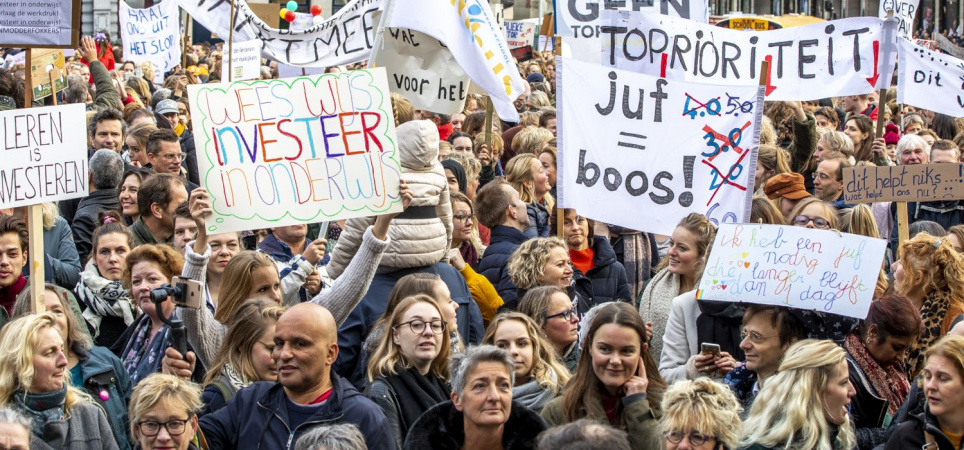Actions continue: two-day strike in January
De AObmembers have spoken out: on Thursday 30 and Friday 31 January, primary and secondary education will be shut down. “After all the actions, the cabinet has still not provided structural extra money,” says AObchairman Eugenie Stolk. "We are now increasing the pressure: the willingness to take action is enormous."

Picture: Fred van Diem
The figures speak volumes: more than 90 percent of the AObmembers in primary and secondary education believe that follow-up actions are needed in 2020 after this year's strikes. This is evident from a poll by the AOb which has been filled in by more than six thousand members.
Two days
In secondary education, nearly 70 percent of the AOb-members a two-day strike, in primary education the willingness to strike is even greater: over 90 percent of the members want to strike for two consecutive days.
If there is no structural money, we will continue to campaign structurally
“The members have spoken out clearly: the willingness to take action is enormous,” says AObchairman Stolk. “That is why we are kicking off the 2020 action year with a two-day strike. Let's hope that there will finally be structural funding for education. If there is no structural funding, we will continue to take structural action. ”
Make-do
The problems are obvious in primary education. Stolk: “There is an enormous teacher shortage that has to be taken care of everywhere. As a result, the workload for the current teachers and support staff increases enormously. The salaries have to be raised, so that it becomes attractive again to choose the beautiful teaching profession. ”
Dutch teachers already spend more hours in the classroom than their colleagues in most other European countries
In secondary education, the problems are less visible to the outside world, for example because entire classes are not sent home all day long. Stolk: “But there is also a teacher shortage there, so that lessons are canceled and unauthorized teachers are put in front of the class. Which also increases the workload for colleagues. And that while Dutch teachers already spend more hours in front of the classroom than colleagues in most other European countries. The quality of education is therefore also under pressure in secondary education, despite the fact that teachers have to work three rounds in order to prevent this as much as possible. ”
In total, an extra 2,7 billion euros is needed to reduce the workload and increase the salaries of all teaching staff.
CLA negotiations
The two-day strike only has something to do with it indirectly blows from the negotiations for a new collective labor agreement in primary education. Stolk: “The actions are aimed at structural investments in education, not against the employers' organization PO-council. But the difficulties with concluding a collective labor agreement are partly due to the tight funding. All the more need to take action for structural extra money. ”
What the promotions will look like on Thursday 30 and Friday 31 January, the AOb announced soon. Among others on AOb. Nl


